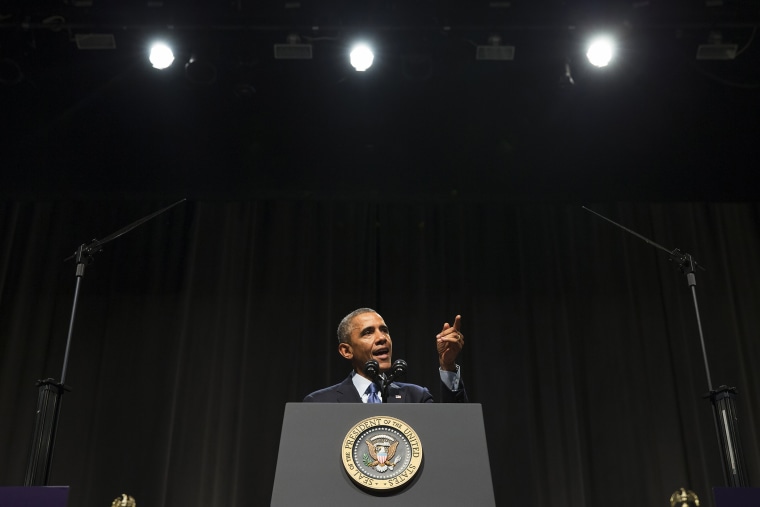President Obama insisted he wasn't giving "a political speech" at Chicago's Northwestern University on Thursday. His stated goal was to discuss the economy. "I'm not going to tell you who to vote for — though I suppose it is kind of implied," he told the audience.
Nonetheless, Obama's underlying message was clearly directed at 2014 voters: Democrats have managed to pull the economy out of a historic recession, and their visions for the future will help ordinary Americans because they rely on real facts and empirical evidence, the president concluded.
Obama spent the bulk of his speech defending his economic record and expressing his optimism for the future of the U.S. economy. "By every economic measure, we are better off now than when I took office," he said.
The president celebrated the gains made in the manufacturing sector, education, and energy sectors, as well as falling deficits, new financial regulation, and health-care reform. "While good, affordable health care might still be a fanged threat to freedom of the American people on Fox News, it's turns out it’s working pretty well in the real world," he said.
At the same time, Obama acknowledged that many Americans were hurting economically, lamenting that "too many families still work too many hours with too little to show for it."
The policy goals that he laid out to solve these problems were nothing new — instead they were just reiterations of the main pillars of the Democratic agenda: Raising the minimum wage; investing in clean energy, infrastructure, and basic research and development; implementing universal pre-K, equal pay measures, and better family leave; and passing an immigration overhaul.
But Obama spent much of his speech stressing that the party's agenda is, in fact, pro-business, pro-capitalist — and supported by hard evidence. "I have laid out my ideas to create more jobs and grow more wages. And I’ve also tried to correct the record. As I said, there’s a lot of noise out there. Every item I’ve ticked off — those are facts, it’s not conjecture. It’s not rhetoric, those are the facts," he said.
The problem with Republicans, Obama continued, was that they failed to have the facts on their side. "Just last month, at least one top Republican in Congress said that tax cuts for those at the top are — and I’m quoting —'even more pressing now' than they were 30 years ago," Obama said, eluding to remarks Rep. Paul Ryan made in August. "What are the facts? What are the empirical data that would justify this conclusion?" he continued.
"Has anyone seen a credible argument that that is what our argument needs right now? Seriously? If you watch the debate, including on some of the business newscasts, and folks are just pontificating — what’s the data, what’s the proof? If there were any credible argument that says when those at the top do well, eventually everyone else will do well, it would have borne itself out by now. We’d see data that that was true. It’s not," Obama said.
With his own approval ratings still in the doldrums, the president distanced himself from the midterm elections this summer. He barely mentioned the word "Democrat" in his speech on Thursday. "I’m not on the ballot this fall. Michelle's pretty happy about that. But make no mistake: These policies are on the ballot. Every single one of them," he said.
And Obama's ultimate takeaway for voters was an unabashedly partisan one: "Right now, you’ve got starkly different visions for the country," he said. "There's one clear choice here — it’s supported by facts."
